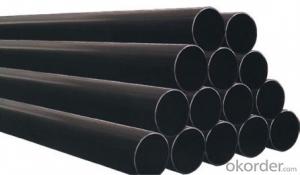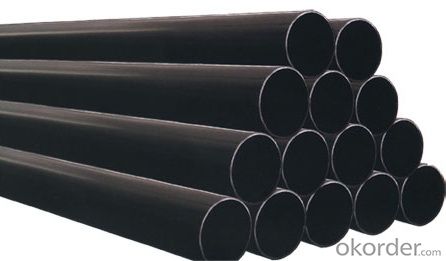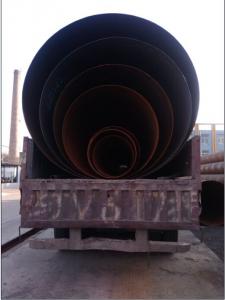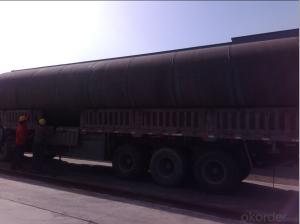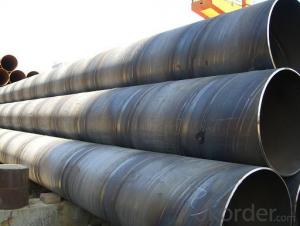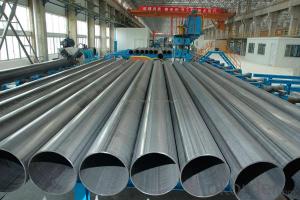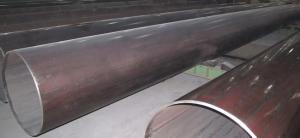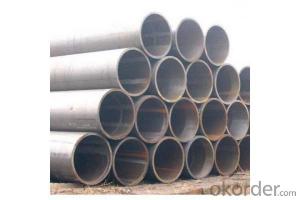52'' CARBON STEEL SSAW WELDED PIPE API/ASTM/JIS/DIN
- Loading Port:
- Tianjin
- Payment Terms:
- TT OR LC
- Min Order Qty:
- 5 m.t
- Supply Capability:
- 300 m.t/month
OKorder Service Pledge
OKorder Financial Service
You Might Also Like
Packaging & Delivery
Packaging Detail: | standard export packing or as customer's requirement |
Delivery Detail: | within 10 - 30 days |
Specifications
Spiral Welded Steel Pipes and Tubes
1.Material:Q195-Q235
2.Length:1-12m
3.WT:1.0-14mm
4.O.D.:20-273mm
Product Description:
1.Material : Q235,Q345,L245,L290,L360,L415,L450,L485,GrB,X42,46,X52,X56,X60,X65,X70,X80,X100
2,Standard: SY/T5037-2000,GB/T9711-2011,API Spec 5L PSL1/PSL2,ASTM A252\A53,ISO3183,DIN17172,EN10217,JIS G3457,AWWA C200,ASTM A139,ASTM A671,ASTM A672
3.Wall thickness: 3.0mm-30mm
4.Outer diameter: φ168mm-3020mm
5,Length: 5m-12m or as your requirement
6,Corrosion protection standard: DIN30670,DIN30671, AWWAC210, AWWA C203, SY/T0413-2002,SY/T0414-2002
7,Application: Oil, gas, natural gas, water pipe, thermal electricity pipe, steel structure engineering, etc
Q195-q345 Material Steel Pipe's Materials
Elements | Chemical Compsition% | Mechanical Property | ||||||
C% | Mn% | S% | P% | Si% | Yield Point (Mpa) | Tensile Strength(Mpa) | Elongation | |
Q195 | 0.06-0.12 | 0.25-0.50 | <0.050< span=""> | <0.045< span=""> | <0.030< span=""> | >195 | 315-430 | 32-33 |
Q215 | 0.09-0.15 | 0.25-0.55 | <0.05< span=""> | <0.045< span=""> | <0.030< span=""> | >215 | 335-450 | 26-31 |
Q235 | 0.12-0.20 | 0.30-0.70 | <0.045< span=""> | <0.045< span=""> | <0.030< span=""> | >235 | 375-500 | 24-26 |
Q345 | <0.20< span=""> | 1.0-1.6 | <0.040< span=""> | <0.040< span=""> | <0.55< span=""> | >345 | 470-630 | 21-22 |
Packaging & Delivery
Packaging Detail: | Normal exporting packing,in container or bulk vessel or as per clients' request |
Delivery Detail: | 2 months after confimed contract |
Specifications
Large Diameter API 5L X70 PSL2 LSAW Steel Pipe
Grade: X42, X46, X50, X52, X60, B, C
OD: 1.5"-28"
WT: SCH10-SCH160
Brand:TPCO
Large Diameter API 5L X70 PSL2 LSAW Steel Pipe
Specifications:
u Standard: API 5L
u Grade: B, C, X42, X46, X50, X52, X56, X60, X65, X70, X80
u OD: 1.5"-28"
u WT: SCH10-SCH160
u Length: 5-12m
u Ends Finish: plain end, bevel end, grooved end
u Surface Treatment: bare, black varnished, oiled finish, red color, anti-corrosion, 3PE, FBE or epoxy coating
u Technique: hot rolled or cold drawn
u Application: api 5l steel pipe for conveying oil, water, gas
u Invoicing: based on theoretical weight or actual weight
u Payment Terms: L/C at sight, T/T or Western Union
u Trade Terms: FOB, CFR, CIF
u Certification: ABS manufacturing assessment, ABS design assessment, API 5CT, API 5L, DNV manufacturer certificate, ISO9001 quality management system certificate, ISO14001 environment management system certificate, GB/T28001 occupational health and safety management system certificate, A1 class manufacturing license of special equipment certificate, CCS, GL, LR, SGS, TüV, PDE
- Q: How are steel pipes used in the power generation industry?
- Steel pipes are widely used in the power generation industry for various purposes such as transporting fluids, gases, and steam, as well as for structural support and heat exchange. They are used in power plants for conveying cooling water, fuel, and exhaust gases, as well as in boiler systems for transporting high-pressure steam. Additionally, steel pipes are utilized for constructing heat exchangers, condensers, and other critical components, ensuring the efficient and reliable operation of power generation facilities.
- Q: How are steel pipes used in the construction of industrial facilities?
- Steel pipes are commonly used in the construction of industrial facilities for various purposes such as transporting fluids, gases, and steam, as well as providing structural support and carrying electrical wiring. They are durable, resistant to corrosion, and can withstand high pressure and temperature, making them ideal for industrial settings.
- Q: What is the difference between steel pipe and PVC pipe?
- Both steel pipe and PVC pipe are commonly utilized materials for plumbing and other construction purposes; however, they possess several distinct dissimilarities. To begin with, the materials themselves differ. Steel pipe is manufactured from a blend of iron and carbon, known as steel. This material is renowned for its robustness and durability, rendering it appropriate for high-pressure applications and subterranean installations. Conversely, PVC (polyvinyl chloride) pipe is crafted from a type of plastic called PVC. PVC pipe is characterized by its lightweight nature, flexibility, and ease of handling, making it a favored choice for residential plumbing and irrigation systems. Next, the installation process varies. Steel pipe necessitates skilled labor and specialized tools for cutting, threading, and welding. It frequently involves a complex installation procedure, particularly for larger pipe sizes. Conversely, PVC pipe can be effortlessly cut with a saw or specialized pipe cutter and joined together utilizing solvent cement or threaded fittings. This renders PVC pipe more suitable for DIY projects and simpler installations. Moreover, steel pipe incurs greater costs compared to PVC pipe. Steel is a pricier material, and the manufacturing process for steel pipe is more intricate, entailing multiple steps and additional materials. PVC pipe, as a plastic-based material, is generally less expensive and more cost-effective, particularly for smaller diameter applications. In terms of performance, steel pipe possesses greater tensile strength, can endure higher levels of pressure, and exhibits greater resistance to temperature fluctuations, rendering it ideal for heavy-duty and industrial applications. Conversely, PVC pipe possesses lower tensile strength but is resistant to corrosion, chemicals, and scale buildup. PVC pipe is commonly employed in residential plumbing, irrigation systems, and other non-industrial applications. To summarize, the primary disparities between steel pipe and PVC pipe revolve around the materials used, installation processes, costs, and performance characteristics. While steel pipe is sturdier and more suitable for heavy-duty applications, PVC pipe is lighter, easier to install, and more cost-effective for residential and non-industrial purposes.
- Q: What are the specifications for steel pipes used in high-pressure applications?
- The specifications for steel pipes used in high-pressure applications typically include requirements for the pipe material, such as high strength and resistance to corrosion, as well as specific dimensions, thickness, and wall thickness to withstand the pressure. Additionally, they may need to meet specific industry standards, such as ASTM or ASME, and be tested for quality assurance, including pressure testing and non-destructive testing methods.
- Q: Can steel pipes be used for underground gas pipelines?
- Yes, steel pipes can be used for underground gas pipelines. Steel pipes are commonly used in the construction of gas pipelines due to their strength, durability, and resistance to corrosion. They provide a reliable and safe means of transporting gas underground.
- Q: Are metal spiral tubes the same as metal bellows?
- The spiral tube called spiral steel tube or spiral welded pipe, the low carbon steel or low alloy structural steel strips in a helical line certain angle (called forming angle) rolled into a tube, then the tube welding seam made up, it can be used in narrow strip production of large diameter steel pipe. The pitch of a spiral pipe is much larger than that of a bellows.
- Q: The plastic pipe and steel pipe difference
- In the plastic coated galvanized steel pipe inside the plastic coated manufacturing method. The thickness of the internal plastic is thin, which is equal to a plastic skin.
- Q: What are low-pressure carbon steel tubes?
- Any of various steels that contain less than 2.11% of the mass of carbon but contain no alloying elements. Sometimes referred to as plain carbon steel or carbon steel.Carbon steel, in addition to carbon, usually contains a small amount of silicon, manganese, sulfur and phosphorus.1) according to the use of carbon steel can be divided into carbon structural steel, carbon tool steel and easy to cut structural steel three categories, carbon structural steel is divided into engineering construction steel and machine manufacturing structural steel two kinds;(2) by refining methods can be divided into open hearth steel, converter steel;(3) according to deoxidization methods, they can be divided into boiling steel (F), killed steel (Z), semi killed steel (b) and special killed steel (TZ);(4) according to the carbon content of the steel can be divided into low carbon steel (WC = 0.25%), carbon steel (WC0.25% - 0.6%) and high carbon steel (WC>0.6%);(5) according to the quality of steel, carbon steel can be divided into ordinary carbon steel (phosphorus, sulfur, higher), high quality carbon steel (low phosphorus and sulfur) and high quality steel (lower phosphorus and sulfur) and super quality steel.Description: the carbon content in general carbon steel is higher, the hardness is higher, the strength is higher, but the plasticity is lower.
- Q: Can steel pipes be used for underground utility lines?
- Yes, steel pipes can be used for underground utility lines. Steel pipes are known for their durability and strength, making them suitable for underground applications. They can withstand heavy loads, pressure, and corrosion, which are essential factors for utility lines that are buried underground. Additionally, steel pipes can be welded or threaded together, allowing for easy installation and maintenance.
Send your message to us
52'' CARBON STEEL SSAW WELDED PIPE API/ASTM/JIS/DIN
- Loading Port:
- Tianjin
- Payment Terms:
- TT OR LC
- Min Order Qty:
- 5 m.t
- Supply Capability:
- 300 m.t/month
OKorder Service Pledge
OKorder Financial Service
Similar products
Hot products
Hot Searches
Related keywords
